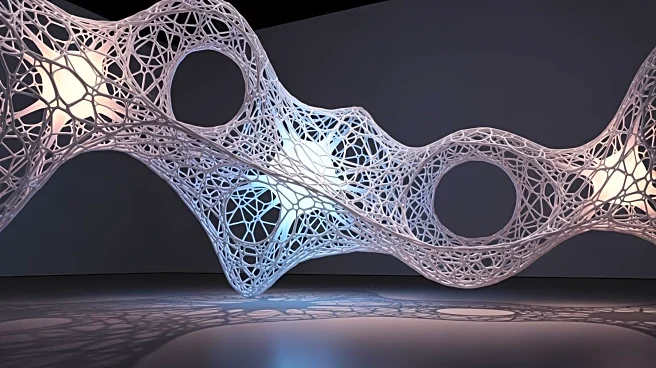What's Happening?
Media artist Refik Anadol is set to open Dataland, the world's first museum dedicated to AI arts, in the Frank Gehry-designed Grand L.A. complex in downtown Los Angeles. Originally scheduled for this year,
the opening has been postponed to spring 2026. Anadol unveiled a preview of the Infinity Room, one of the museum's five galleries, which features his signature swirling colors and AI-generated scents. The immersive experience is powered by the Large Nature Model, an AI developed by Anadol's studio. The Infinity Room concept dates back to 2014, when Anadol created his first immersive data sculpture at UCLA, exploring the future of the Light and Space movement. The room has toured 35 cities and been viewed by over 10 million people.
Why It's Important?
The opening of Dataland represents a significant milestone in the integration of AI into the arts, showcasing how technology can transform traditional artistic expressions. This development highlights the growing influence of AI in various sectors, including the art world, where it challenges conventional notions of creativity and authorship. Anadol's emphasis on 'ethical AI' underscores the importance of responsible AI usage, particularly in creative fields. The museum's use of renewable energy for its AI research aligns with broader environmental sustainability goals, setting a precedent for future tech-driven art initiatives.
What's Next?
With the opening delayed to spring 2026, anticipation builds around how Dataland will influence the art community and public perception of AI. Stakeholders, including artists, technologists, and environmental advocates, may engage in discussions about the ethical implications of AI in art. The museum's debut could spark further interest in AI-driven art projects and collaborations, potentially leading to new funding opportunities and partnerships. As the opening approaches, Anadol's studio may release additional previews or host events to maintain public interest and engagement.
Beyond the Headlines
Dataland's focus on AI-generated art raises questions about the future of human creativity and the role of technology in shaping cultural narratives. The museum's approach to multisensory experiences could redefine how audiences interact with art, emphasizing the importance of immersive environments. Ethical considerations surrounding AI usage in art may prompt discussions on intellectual property rights and the authenticity of AI-generated works. Long-term, Dataland could influence educational programs, encouraging institutions to incorporate AI into art curricula.










